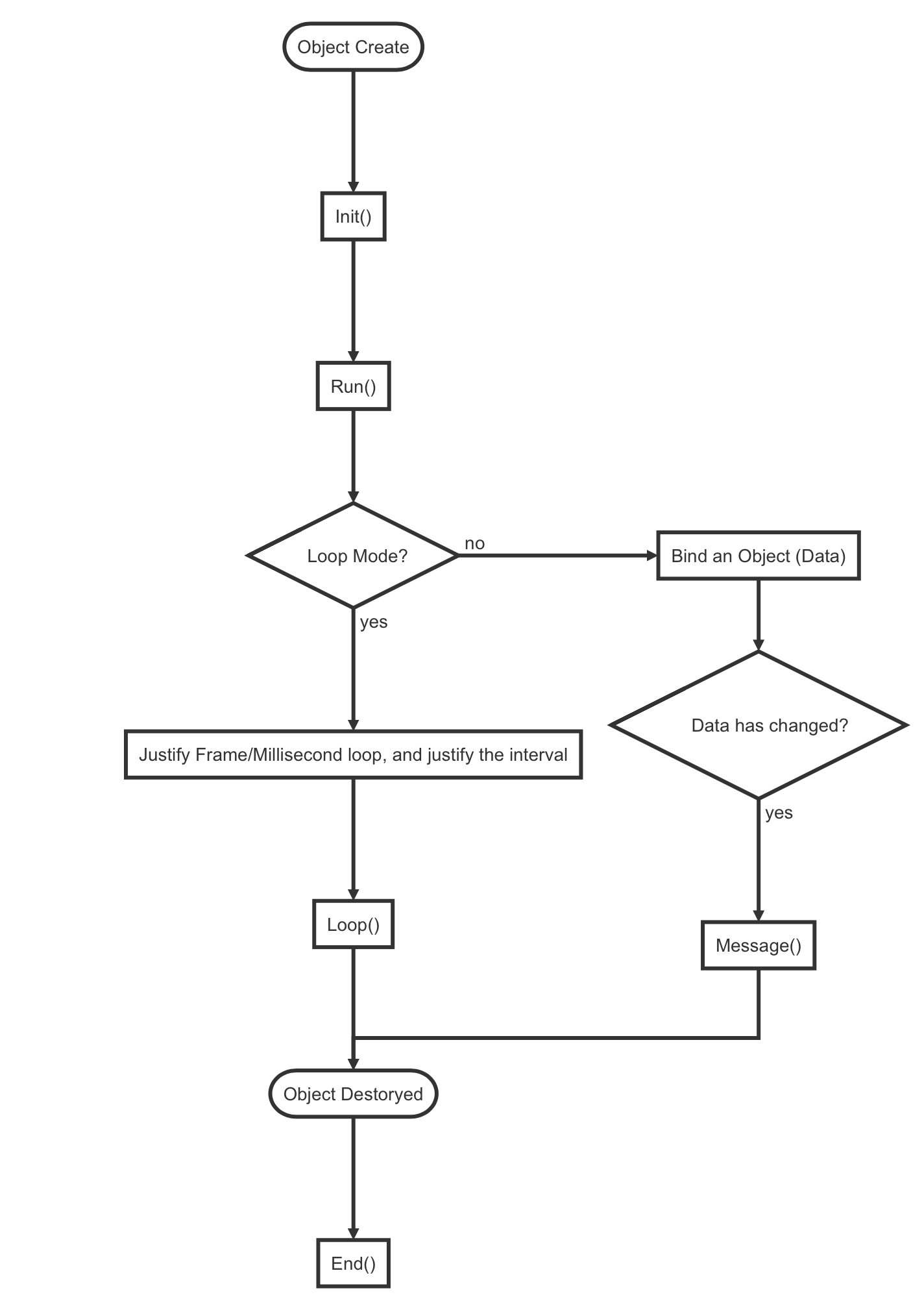JUI
JEngine已推出提高UI开发效率的功能(支持操作任何UGUI组件, 例如:Button, Text, Slider,等)
为什么使用JUI?
- 链式编程
- 数据绑定
- 循环更新
- 精简强大
- 基类使用JBehaviour,低GC高性能

APIs
onInit(Action<JUI> init)onRun(Action<JUI> run)onLoop(Action<JUI> loop)onEnd(Action<JUI> end)onMessage<T>(Action<JUI,T> message)Bind<T>(BindableProperty<T> val)Element<T>() where T: UIBehaviourActivate()
如何使用
在您的热更工程里,引入以下命名空间
using JEngine.UI;用
JUI.CreateOn(GameObject gameObject)方法创建JUI//Here it is an example of adding JUI JUI t = JUI.CreateOn(GameObject.Find("Canvas/AnyGameObject"));可以对JUI的生命周期进行分配:
//To Init it t.onInit(t => { }); //To Run it t.onRun(t => { }); //When it has ended t.onEnd(t => { }); //To Loop it t.onLoop(t => { }); // To Bind a Data BindableProperty<int> i = new BindableProperty<int>(0); t.Bind(i);//Bind JUI to an data //What to do when data has updated t.onMessage<int>((t,value) => { });激活JUI(必备):
t.Activate();恭喜!成功使用 (记住第四步激活JUI)
删除,可以直接删GameObject,或使用JBehaviour的销毁方法:
JBehaviour.RemoveJBehaviour(jui);
扩展
链式编程
JUIText t = JUI.CreateOn(GameObject.Find("Canvas/Text"))
.onInit(t1 =>
{
})
.onRun(t2 =>
{
})
.onLoop(t3 =>
{
})
.onEnd(t4 =>
{
})
.Activate();
Demo示例(包含90%的API使用)
使用循环来实现倒计时
public class Example
{
public void Start()
{
/*
* ========================================================================
* 10 seconds countdown demo
* 10秒倒计时例子
* ========================================================================
*/
int i = 10;
JUI t = JUI.CreateOn(GameObject.Find("Canvas/Text"))//给一个GameObject绑定JUI,该GameObject可以不包含任何UI控件
.onInit(t1 =>
{
var text = t1.Element<Text>();
text.text = "I have been Inited!";
Debug.Log(text.text);
})
.onRun(t2 =>
{
var text = t2.Element<Text>();
text.text = "I am Running!";
Debug.Log(text.text);
//Set the loop mode and frequency
t2.FrameMode = false;//Run in milliseconds
t2.Frequency = 1000;//Run in every 1000 ms (1 second)
UnityEngine.Object.Destroy(t2.gameObject, 10);
})
.onLoop(t3 =>
{
i--;
var text = t3.Element<Text>();
text.text = "I will be destroyed in " + i +" seconds!";
})
.onEnd(t4 =>
{
Debug.Log("My lifecycle has been ended!");
})
.Activate();
}
}
数据绑定
[Serializable]
public class Data
{
public int a = 0;
public BindableProperty<int> b = new BindableProperty<int>(0);
}
/// <summary>
/// This showcase shows how JUI works if an UI needs to update frequently
/// </summary>
public class Demo :MonoBehaviour
{
public static Demo Instance;
public Data data;
public void Awake()
{
Instance = this;
data = new Data();//Create data
}
//You need Start here in ILRuntime so that it leads to update
//If you dont have Start method when you inherit MonoBehaviour, ILRuntime will not call Update (It is an unknown bug and i will fix it soon as possible)
public void Start()
{
}
float seconds = 0;
//pretends to modify data every second
public void Update()
{
seconds += Time.deltaTime;
if (seconds >= 1)
{
data.a++;//Pretending modifing data
data.b.Value++;//Pretending modifing data
seconds -= 1;
}
}
}
public class JUIShowcase : MonoBehaviour
{
GameObject a;
GameObject b;
#region NORMAL WAY TO UPDATE UI
public void Awake()
{
//Add showcase data
new GameObject("BindShowcase").AddComponent<Demo>();
a = GameObject.Find("Canvas/A");//Bind the gameobject which has the UI element
}
//In normal way you need to update your UI in every frame so that you can make your text acurately present your data
int times = 0;
public void Update()
{
a.GetComponent<Text>().text = "(Without JUI)a="+Demo.Instance.data.a.ToString()+"\n<size=20>I have been run for "+times+" times</size>";//Update UI
times++;
}
#endregion
#region USE JUI TO UPDATE UI(With Bind)
/*
* ========================================================================
* JUI bind demo
* JUI绑定数据例子
* ========================================================================
*/
public void Start()
{
b = GameObject.Find("Canvas/B");//Bind gameobject to show data
//In JUI it is easy to bind data with text
int times2 = 0;
var JUI = JUI.CreateOn(b)//Add JUI to an gameobject
.Bind(Demo.Instance.data.b)//Bind data.b to this gameobject
.onMessage<int>((t1,intVal) =>//Tells JUI what to do when the binded data has updated
{
//EG. we have update UI here
t1.Element<Text>().text = "(With JUI)b=" + intVal.ToString() + "\n<size=20>I have been run for " + times2 + " times</size>";
//You can convert bindable properties easily and get their values
times2++;
})
.Activate();//Activate the UI
}
#endregion
控制循环频率 (如果你想要UI循环更新的话)
JUI继承自JUIBehaviour,可以控制循环模式和频率。
FrameMode:bool,如果为true,帧循环;反之,毫秒循环 ,默认为trueFrequency:int,代表循环的间隔时间,代表毫秒或帧数,默认为1
如何绑定数据到JUI
void MyJUIExample()
{
MyData data;//Create a data
JUI jui = JUI.CreateOn(GameObject.Find("Canvas/MyUIElement"))//Add JUI to an UI element
.Bind(data.b)//Bind a data
.onMessage<int>((t,intVal) => //Tell what to do when data has changed
{
Debug.Log("b has changed!");
})
.Activate(); //Activate JUI
}
如何获得JUI组件上的其他UI组件
JUI jui = JUI.CreateOn(GameObject.Find("Canvas/MyUIElement"));//Add JUI to an UI element
Button btn = jui.Element<Button>();//It is a generic method to get an UI element
//If you dont have this component on the element, JUI will automatically add one
